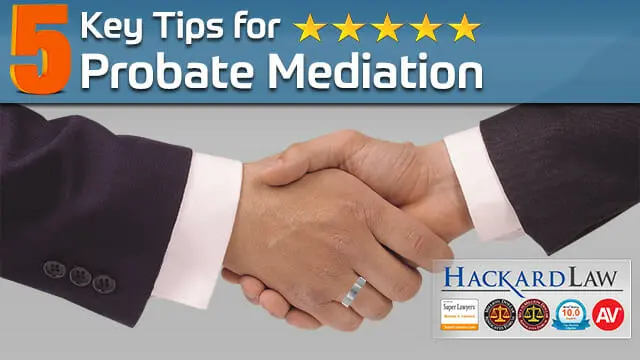
5 Key Tips on Trust Mediation & Settlement | CA Estate & Trust Litigation Attorney
If you are involved in trust or probate litigation in Sacramento, Oakland, San Francisco, Los Angeles or any other California City or County, you may be going to mediation (court-ordered or voluntary). If so, you should be armed with some simple truths about mediation and settlement.
Number 1: What is mediation? Mediation is the process by which a neutral person facilitates communications between two or more disputing parties to assist them in reaching a mutually acceptable agreement.
Number 2: Do Settlement Agreements Have to Be In Writing? A successful mediation is often documented at the end of the process by a short summary agreement – sometimes called a term sheet – signed by all the parties. When this is not practical and the parties otherwise agree, oral agreements can be made on the record and be followed by a writing.
Number 3: Do Courts Require That Parties Mediate Trust, Estate and Probate Disputes? Estate litigators representing heirs and beneficiaries challenging California Trusts and Wills generally file the Trust or Will Contest in the probate division of the Superior Court in which the decedent lived or the Trust is being administered. Some cases are also filed in the Civil Division of the Superior Court. Courts overseeing such litigation often order the California disputing parties to mediation. Such orders are made to force the parties to try to settle the inheritance lawsuit. Many times there are settlements reached in the Superior Courts.
Number 4: Do All Settlement Agreements Have to Be Approved by the Court? Not all settlement agreements need to be approved by the Court, but it is often the better practice to have a settlement agreement approved by the court. Even absent court approval a settlement agreement is a contract and “a deal is a deal.” Of course, the contract itself could provide that it is null and void if not approved by the court.
Number 5: Will Courts Enforce Settlement Agreements? When Hackard Law represents clients who become parties to estate, trust and probate settlement agreements we make sure that the Court retains jurisdiction over the settlement.
Discovery proceedings generally stop when there is a settlement agreement. This is something that should be addressed. The need to inform the court of the settlement should also be discussed and a plan of action put in place.
You have the right to settle your case, as well as the right to move forward in your trust litigation. California estate heirs and beneficiaries, whether in Los Angeles, Sacramento or the Bay Area, should talk with an experienced trust attorney to understand just what is required to do to meet the terms of a settlement deal. If you’re facing potential litigation, take the right steps to prepare: call Hackard Law today at 916-313-3030. We’ll be glad to listen your story.

 (916) 775-8542
(916) 775-8542